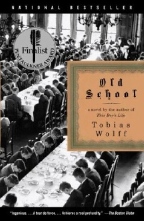Old School
Tobias Wolff
Vintage / Random House
US Trade Paperback Reprint
ISBN: 0-375-70149-4
Publication Date: November 4, 2003
195 Pages; $12.00
Date Reviewed: October 2004
Reviewed by: Serena Trowbridge © 2004

REFERENCES
COLUMNS
|
|
|
Old SchoolTobias WolffVintage / Random HouseUS Trade Paperback ReprintISBN: 0-375-70149-4Publication Date: November 4, 2003195 Pages; $12.00Date Reviewed: October 2004Reviewed by: Serena Trowbridge © 2004 |
|
|
REFERENCES |
COLUMNS |
This is my kind of book - about the glamour of English Literature of a subject. I will start off by illustrating this point with a quote from early in the book, about the English teachers in the school:
"Adept as they were at dissection, they would never leave a poem or a novel strewn about in pieces like some butchered frog reeking of formaldehyde. They'd stitch it back together with history and psychology, philosophy, religion, and even, on occasion, science. Without pandering to your presumed desire to identify with the hero of a story, they made you feel that what mattered to the write had consequence for you, too."
English teachers - and students - take note! However, while the glamour lasts, the underlying innocence of the novel changes. At first, the young protagonist and his school friends, absorbed in their classes, the school literary magazine and the competition to get to spend an hour with the guest writer (Robert Frost is the first one), are normal, if rather academic and sheltered, boys growing up in the boarding school world of the Sixties. In the love and understanding of literature, the atmosphere of Old School is not unlike "Dead Poets Society", though a comparison between the two is unrealistic. However, their ambition and also their reading allows them to develop and mature, sometimes in good and useful ways and sometimes in rather less appropriate ways.
The influences of writing and writers are portrayed with considerable, and realistic, force here. A certain book, by visiting author Ayn Rand, changes the life of the aspiring writer; he reads it obsessively, over and over again. After meeting the writer, however, his views start to change, and he begins to see the disillusionment that can follow infatuation. Personally, my views were shaped, and sometimes changed, by what I read as a child and teenager, and so the passionate reading and writing of the boys of Old School struck a chord with me. The fact that they boys have the chance to meet the author of a book they have engaged with, and ask questions and interact, says a lot about the business of writing and allows Wolff to consider the links between a writer and the book, which are not always immediately apparent or necessarily important to the reader.
The nature of aspiration and ambition, so often particularly deadly in budding writers, is considered here as the boys compete with a piece of fiction for a chance to spend time with a literary idol. The culmination of this competition is when Hemingway, adored by all the boys, is the visitor, and it is this that leads to the unethical downfall of the hero, or anti-hero, of Wolff's novel. Interestingly, it also allows the reader to see the aftermath of the hero's life; how his decisions affect his future, and his later conclusions on his behavior and how he develops his own writer's life. The ending of the scandal is also depicted form the school's side, with the masters becoming humans in their own right.
This is an unusual novel, in that it is about literature and the exploration of ideas and ideals, and ethics, yet does not judge for you, leaving the reader to draw personal conclusions - as the best teachers allow you to. In less than two hundred pages it covers an immense variety of subjects and possibilities, partly by drawing on a history of intertextuality, permitting the reader to fill in great swathes of the world's literature by simply mentioning a writer's name, and this short novel says a lot more than some very long books. The influence of literature is without doubt one of the foremost concepts of this novel; allow it to influence you.